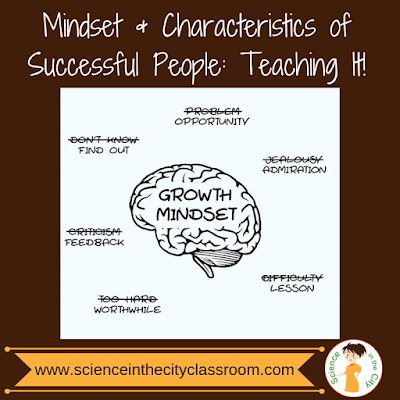Mindset and Characteristics of Successful People: Teaching It!
What characteristics make a successful scientist?
Many students believe that these characteristics are innate characteristics that someone either has or doesn’t have. This could not be further from the truth. In reality, characteristics of scientists, and characteristics of successful people in general, can be learned. Mindset can change and develop!
Dataquest defines traits as “a mental habit with broad applications” and defines the five essential traits as curiosity, clarity, creativity, skepticism, and humility. In this article the author outlines steps to take to develop each of these traits. Again, these can be learned.
Human Nature Concepts also writes about the 10 Characteristics of scientists, and identifies them as follows: curiosity, open-minded, keen observer, resourceful, purposeful, good communicator, persistent, creative, critical thinker, and courageous.
Michigan State University also answers the question of “What Makes a Good Scientist?” with a very similar list: curious, patient, courageous, detail-oriented, creative, persistent, communicative, open-minded, and critical thinker/problem solver.
Lastly, the
Nobel Prize Inspiration Initiative has several different interviews on the topic of “What Makes a Good Scientist?”
All of these have many qualities in common, as you may have noticed. Are these qualities that you see in your students? If not, how can we teach/emphasize these qualities to students?
How do we teach these skills?
We can (and probably do) teach many of this skills as part of science. I know we try to teach observation, skepticism, and problem solving (certainly part of the new science standards). I’m sure we teach lessons that work on creativity and resourcefulness (perhaps integrated with engineering design, or creating a presentation. But how to we encourage these throughout the year, and really get students to think of themselves as having these skills? Although these lessons are great, and they introduce these skills, students need to see them on a regular basis, and see them applied. Otherwise it’s far too easy for these to be removed from real life, and become another abstract classroom lesson
We need to practice, demonstrate, and reinforce these skills on a regular basis to change students’ mindset, and self-image.
As science teachers, it is likely that we practice those that are more traditional science skills throughout the year, such as observation, and communication, but what about things like persistence, courage, and curiosity. These can be encouraged in the classroom through both the frequent use of examples and role models, affirmations, and a change in classroom culture.
These characteristics are very similar to the idea of growth mindset. Here is a great article on
6 Tips to Help Students Develop a Growth Mindset. Interestingly, one of their strategies is to Read books with characters who face challenges and develop strategies to overcome them, in other words, to utilize role models, similar to those discussed in my
last post.
It is also a great idea to change the language in the classroom, to model it yourself, and to utilize affirmations and inspirational bulletin boards. Here is a
huge list of free printables that you could certainly use in your classroom.
It is equally important to tie these to real-life examples, however, such as other people who have demonstrated these skills. Some examples can be seen in this
Growing Bundle.
I’d love to hear your ideas for particular lessons or things that you do in class that help students practice and reinforce the mindest and traits of scientists. Do you have an particular lessons that are great ways to teach these skills? If so, feel free to comment below, or jump in our Facebook Group and share!






